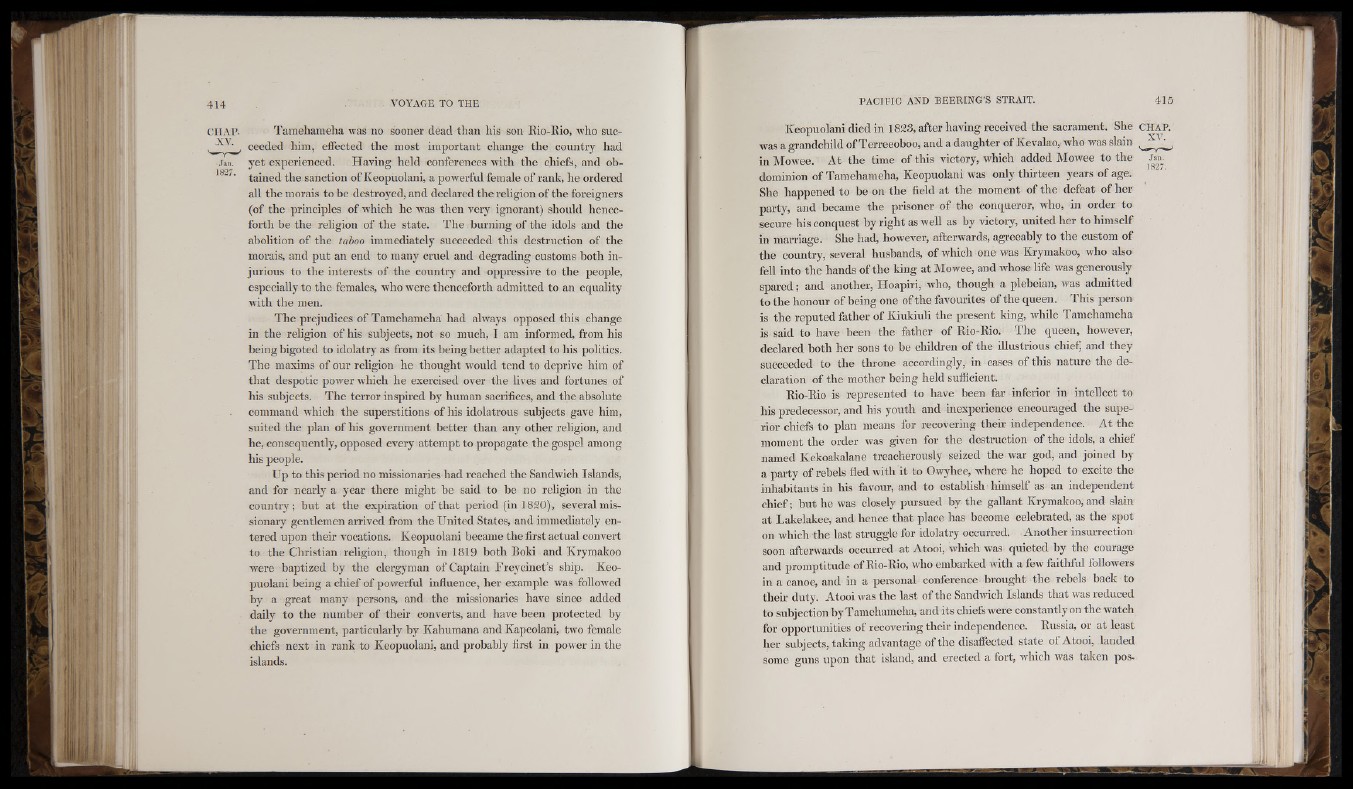
Tamehameha was no sooner dead than his son Eio-Eio, who succeeded
him, effected the most important cliange the country had
yet experienced. Having held conferences with the chiefs, and obtained
the sanction of Keopuolani, a powerful female of rank, he ordered
all the moráis to be destroyed, and declared the religion of the foreigners
(of the principles of wliich he ivas then very ignorant) should henceforth
be the religion of the state. The burning of the idols and the
abolition of the taboo immediately succeeded this destruction of the
moráis, and put an end to many cruel and degrading customs both injurious
to the interests of the country and oppressive to the people,
especially to the females, who were thenceforth admitted to an equality
with the men.
The prejudices of Tamehameha had always opposed this change
in the religion of his subjects, not so much, I am informed, from his
being bigoted to idolatry as from its being better adapted to his politics.
The maxims of our religion he thought would tend to deprive him of
that despotic power which he exercised over the lives and fortunes of
his subjects. The terror inspired by human sacrifices, and the absolute
command which the superstitions of his idolatrous subjects gave him,
suited the plan of his government better than any other religion, and
he, consequently, opposed every attempt to propagate the gospel among
his people.
Up to this period no missionaries had reached the Sandwich Islands,
and for nearly a year there might be said to be no religion in the
country; but at the expiration of that period (in 1830), several missionary
gentlemen arrived from the United States, and immediately entered
upon their vocations. Keopuolani became the first actual convert
to the Christian religion, though in 1819 both Boki and Krymakoo
were baptized by the clergyman of Captain F reycinet’s ship. Keopuolani
being a chief of powerful influence, her example was followed
by a great many persons, and the missionaries have since added
daily to the number of their converts, and have been protected by
the government, particularly by Kahumana and Kapcolani, two female
chiefs next in rank to Keopuolani, and probably first in power in the
islands.
i,
Keopuolani died in 1 8 2 3 , after having received the sacrament. She C H A P .
was a grandchild of Terreeoboo, and a daughter of Kevalao, who was slain '
in Mowee. At the time of this victory, which added Mowee to the
Jan.
1827.
dominion of Tamehameha, Keopuolani was only thirteen years of age.
She happened to be on the field at the moment of the defeat of her
party, and became the prisoner of the conqueror, who, in order to
secure his conquest by right as well as by victory, united her to himself
in marriage. She had, however, afterwards, agreeably to the custom of
the country, several husbands, of which one was Krymakoo, who also
fell into the hands of the king at Mowee, and whose life was generously
spared; and another, Hoapiri, who, though a plebeian, was admitted
to the honour of being one of the favourites of the queen. This person
is the reputed father of Kiukiuli tlie present king, while Tamehameha
is said to have been the father of Rio-Bio. The queen, however,
declared both her sons to be children of the illustrious chief, and they
succeeded to the throne accordingly, in cases of this nature the declaration
of the mother being held sufficient.
Eio-Eio is represented to have been far inferior in intellect to
his predecessor, and his youth and inexperience encouraged the superior
chiefs to plan means for recovering their independence. At the
moment the order was given for the destruction of the idols, a chief
named ICekoakalane treacherously seized the war god, and joined by
a party of rebels fled with it to Owyhee, where he hoped to excite the
inhabitants in his favour, and to establish himself as an independent
chief; but he was closely pursued by the gallant Krymakoo, and slain
at Lakelakee, and hence that place has become celebrated, as the spot
on which the last struggle for idolatry occurred. Another insurrection
soon afterwards occurred at Atooi, which was quieted by the courage
and promptitude of Eio-Eio, who embarked with a few faithful followers
in a canoe, and in a personal conference brought the rebels back to
their duty. Atooi was the last of the Sandwich Islands that was reduced
to subjection by Tamehameha, and its chiefs were constantly on the watch
for opportunities of recovering their independence. Eussia, or at least
her subjects, taking advantage of the disaffected state of Atooi, landed
some guns upon that island, and erected a fort, which was taken pos